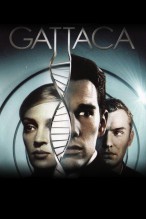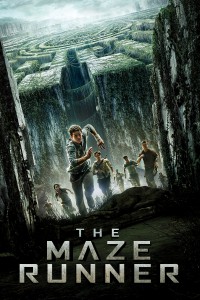Overview
Science fiction drama about a future society in the era of indefinite eugenics where humans are set on a life course depending on their DNA. The young Vincent Freeman is born with a condition that would prevent him from space travel, yet he is determined to infiltrate the GATTACA space program.
Gattaca, like all he very best sic-fi, tells a tale yet manages to deal with broader human issues. It is set in a future where discrimination has now become a science, but it is not based on gender or skin colour but on your genetic code, your DNA. Many children in the society portrayed are genetically designed and have any flaws or imperfections designed out by scientists. They not only eliminate chromosomes that may cause hereditary diseases, but can actively select for characteristics that are likely to give long life, high intelligence, even good eyesight. The world is now divided between those lucky ones whose parents chose or could afford this route, and the rest, who for whatever reason end up being born naturally. Job interviews are now mostly a matter of a DNA swab or blood sample, which instantly can tell a prospective employer a vast amount of information about a candidate, even predicting their date of death, which must be handy for the insurance industry. Consequently those born naturally tend to end up in menial jobs, while the gilded ones with superior genetics glide into managerial and glamorous jobs. Most glamorous of all is to be a space navigator at Gattaca, a sort of latter-day NASA, where rockets periodically blast off into space to explore the solar system.
Vincent, played by Ethan Hawke, was born naturally and has myopia and a potentially serious heart condition; his younger brother Anton was genetically engineered to be without defects. The brothers quickly discover their differences, and when growing up challenge themselves to occasional swims at a nearby beach where they dare each other to go out further and further: Anton, with his superior physique, is the stronger swimmer and aways wins. Vincent would love to be a navigator and is fascinated by the stars, but his parents try and disabuse him of this implausible dream. By the teenage years it is clear that Vincent is destined for a life of drudgery and Anton for greater things. We see Vincent leave home, but before he does they have one last swim challenge. On this occasion Vincent wins through sheer determination, to the astonishment of Anton. The nearest Vincent can get to the cherished Gattaca space facility is to be a cleaner there, and he wistfully watches the rockets launching from the base as he scrubs its floors, while in his spare time studying books on astro-navigation. He discovers that there may after all be a way in, but an illicit and dangerous one. A few genetically designed people drop out of mainstream society for one reason or another, and offer to sell themselves to those wishing to disguise themselves as one of the gilded few. To carry off such a deception is no mean feat, as DNA testing is common, so an impostor will need a regular supply of genetically pure blood, urine, even dead skin cells with which to try to fool automated detectors.
In this way, via a shady intermediary, Vincent meets Jerome (played by Jude Law) a man with superb genetics but who lacks Vincent’s drive and ambition, and who moreover has been confined to a wheelchair by a road accident, and who now has a serious alcohol problem. Jerome agrees to help Vincent take over his identity in return for a share of the riches that Vincent would earn as a navigator at Gattaca, should he be able to get in and keep up the facade. The transformation of Vincent complete, the two of them share a house, Jerome providing the cover that Vincent needs in terms of bodily fluid samples and even recordings of his heartbeat while exercising so that Vincent can pass himself off successfully when being monitored at the facility. Vincent, who now has Jerome’s superb genetic code as a cover, easily obtains a place on the navigator program, and through his previous hard study excels at his new job. His great ambition is t be selected for a mission to Saturn’s moon Titan, and all seems to be on track when the mission director is brutally murdered. This brings Detective Hugo (played by Alan Arkin) to the scene, who in the course of a forensic search discovers a stray eyelash of Vincent’s, which shows up as belonging to an “invalid” i.e. someone who does not belong as an employee at the facility. The detective suspects that whoever this is will probably be the killer, there being no other obvious candidates .He pursues this despite some opposition from his boss, who is unconvinced that this “invalid” is necessarily the killer.
The film then follows the format of a thriller, whereby we are rooting for Vincent to avoid detection as the window for the Titan launch looms and the detective’s net closes. Vincent has time to squeeze in a relationship with a co-worker Irene, played by Uma Thurman. Can he maintain his facade with her as well as avoid the determined detective, at least until the mission launch date? Would she still love him if he was not so genetically perfect? The joy of Gattaca is that is transcends the thriller format and manages, without beating the audience over the head with its message, to ram home the analogy between the prejudices of the fictional society portrayed with our own real life, with its haves and have nots. As a viewer you are left to choose whatever analogy that motivates you, whether it is discrimination against black people, women, gay people or the poor. It is directed subtly, the tension building gradually as we see situations at Gattaca where Vincent has very close encounters that threaten to reveal him. There is also an interesting understated visual style: the future is populated not by people in exotic silvery costumes but by ones in uniform conservative suits and ties. The Gattaca facility is a buttoned-down place, and the facility subtly reminded me of the city in Fritz Lang’s classic Metropolis. As the film concludes there are enough plot twists and turns to satisfy the viewer, yet all the time leaving a deep impression of this divided society. It is haunting film that stays with you long after the first viewing, and it stands up well two decades on, its message as relevant as ever as genetic analysis in the real world inches ever closer to the capabilities seen on the film. Will our society handle this new scientific advance any better than this fictional one?











